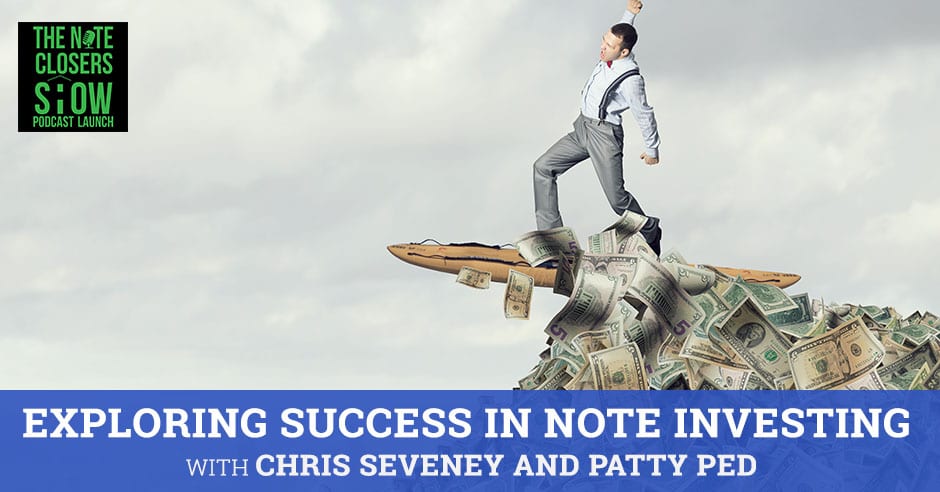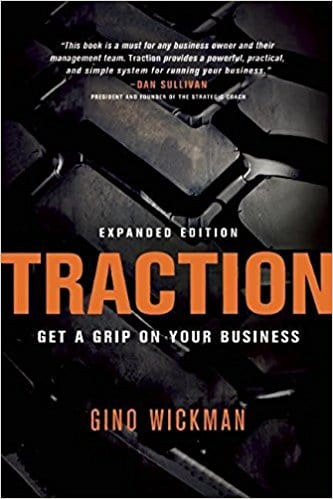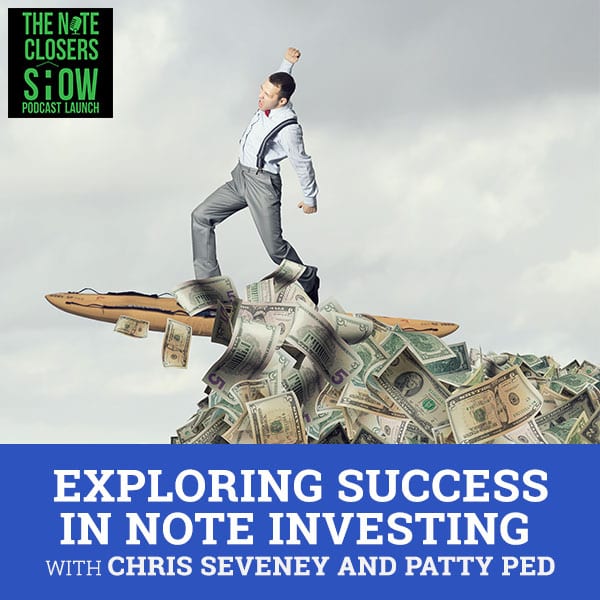
Looking to get into the note business? Guest host Patty Ped talks about successful note investing for industry newcomers with Chris Seveney of 7E Investments. If you’re a borrower in need of multiple options with the opportunity to stay in the home, then Chris Seveney is your guy. Located in Washington, DC, Chris specializes in the acquisition of first position nonperforming and performing notes. Over the past two years, his company has acquired over 50 assets and have provided their investors with above average returns. What makes 7E Investments different is the dedication and the level of commitment that they give to their partners, providing them with the why as they go through the process, and always keeping them informed. The company is currently focused on Eastern Mississippi and south of Pennsylvania.
Patty Ped is the owner of Aider Financials, and like Chris, also invests in distressed mortgages, primarily first liens. They work with JV partners, IRA institutions, and individual investors, with the goal of achieving a win-win situation for everybody who’s involved: the borrowers, the banks and the investors.
—
Listen to the podcast here
Exploring Success in Note Investing With Chris Seveney And Patty Ped
I’m Patty Ped and I’m here with Chris Seveney. We are your guest hosts. Let’s start off by introducing ourselves and what we do. Chris, do you want to go ahead?
I’m Chris Seveney with 7E Investments located in Washington, DC. We specialize in the acquisition of first position non-performing and performing notes. We’ve acquired over 50 assets. Primarily, we focus on Eastern Mississippi and south of Pennsylvania. Our goal is to provide borrowers multiple options with the opportunity to stay in the home if they so desire and also try and provide our investors above average returns. The little differentiator for our company is the dedication and the level of commitment that we provide to our partners and also providing them the why as we go through the process and give them an understanding for what we’re doing so they’re always informed.
I am Patty Ped. I am the Owner of Aider Financials, and like Chris, we also invest in distressed mortgages, primarily first liens. We work with various investors. We have JV partners that we work with, IRA institutions, and individual investors. We work together to achieve a win-win situation for everybody who’s involved, the borrowers, the banks and the investors. Chris, you do have a full-time job. Do you want to tell them how you got started in notes, what got you interested, and how did you even learn about notes?
I work full-time in Washington DC for a real estate investment firm. We develop commercial properties, luxury apartments, office, and retail. I’ve been in real estate for over twenty years. I graduated college with a civil engineering degree, worked up in Boston until 2008 where I’m originally from. In 2008, with what happened with the economy, I relocated to Washington DC. The last ten years I’ve been down here. Like most real estate investors, I started off doing the BiggerPockets BRRRR Strategy. That’s the best way to put it, where I started off buying some assets that were dilapidated, getting them fixed up, refinancing and getting them rented, but having a full-time job and the family.
Between swimming lessons, Taekwondo, Little League, dance, trying to scale that business was extremely difficult. I got caught up on BiggerPockets by Scott Carson and started to hear about notes. I thought that was the best of both worlds because you can do it anywhere, anytime; you’re not attached to getting access to a property by a realtor, literally do it anywhere at anytime. Like many investors, especially being an engineer, I started out with the analysis by paralysis. I watched a lot of video, overanalyzed everything, and it took me about six months before I ended up buying my first note. What about your, Patty?
The story is similar. It was my husband who initially got to know about notes. We started off with rentals. In 2012, we started off with a multifamily unit. It was great cash flow. It covered vacancies and everything and everything was going perfectly, and then the honeymoon period was over and then the tenants started moving out, they started trashing the place. Some of them call us at 2:00 AM saying that the toilets were clogged and we had to send them somebody. Imagine trying to find a plumber at 2:00 AM.
We did all of that and we realized that there should be something better and easier to do. We started exploring all of our options. We looked at tax liens and other things and notes were very intriguing to us. We explored a little bit into that. To dip our toes into this, we started off with performing seconds and they worked out beautifully. Then we went into nonperforming seconds. We started off with that. We had good success with that, so we slowly started scaling our business up a little bit more and now we’re dealing specifically with nonperforming first mortgages.
We built a good team of attorneys, servicers, and realtors in all of these wonderful areas around the country. Like you said, we’re not limited to our backyard. We’re pretty much open to the entire nation, and on the other hand we’re also helping the borrowers and keeping their homes. We are providing them with options that other bigger banks cannot afford to. That’s what drew me to this business. It was wonderful because everybody was happy, our investors were happy, the borrowers were happy, and the banks were happy because they could get rid of all the bad loans from their book. I like making everyone happy.

Note Investing: You’ve got to go with what you’ve got sometimes.
I remember when I was closing my first note deal in one of my apartments, my tenants thought it was wise to put baby potatoes down the drain, calling me up saying there was a clog. The plumber went out and couldn’t get it taken care of and then realized she finally admitted what she had done and so forth, but that was the last straw for me in regards to getting back into notes. You don’t have the tenants, toilets and termites, as they say. What do you see as the biggest challenges in your note business that you face?
Initially, I had a little bit of trouble talking to the homeowners only because I wanted to be sensitive to their hardship. I wanted to be able to help them out, but I was having a little bit of trouble in trying to word it in a certain manner so it wouldn’t offend them, but it would still help them. Also, when I’m talking to the investors, I wanted to make sure that we were looking at our numbers correctly.
One of the biggest things similar to what you mentioned, the analysis paralysis, initially we were focusing so much on the numbers that it was hard to look into the emotional or the non-measurable aspects of this business where we’re looking into the emotional equity, how long the borrower has been living in the property, pride of ownership, how well they’ve been taking care of the property, and all of those other factors that slipped past me only because I was focusing too much on the numbers. I’m learning but that was one of the biggest challenges that I had. Did you face anything similar, Chris?
For me, it was time in marketing. Running the numbers and analyzing the deals came naturally. I’ve seen the kick-ass calculator you have. I’ve spent many hours on my calculator as you have. It works great, but there’s the softer side of investing. You’ve got to go with what you’ve got sometimes, but where I struggled was on that marketing aspect. If I have three hours a day in my note business, I may not be the most creative or might not be the best writer, so something that takes somebody five, ten, fifteen minutes to do might take me an hour to do. The only way to overcome that is by continuing to work it and continuing to focus on it because most people enjoy doing things that they’re good at. When you’re not good at something, you sometimes want to push it aside or not do it. It’s like on your to-do list, you tick off easy tasks, but the more difficult tasks, you wait until the end or you procrastinate. That’s how I have been with marketing. That’s one of the areas that I’ve started to focus on, especially since we met in Austin and took Scott’s Fast Track.
How did you hear about Fast Track? Did you have any training before that to prepare for Fast Track?
I heard about Fast Track back when I started investing in notes. It was Note CAMP 2.0. Scott, for social media reward, would give away entry to his Fast Track for the social media award winner. I saw it and I was like, “This is pretty good.” I’m the type of guy who is very competitive, so when I go for something, I’m all in on it. Note CAMP 3.0, I was starting to try and start marketing and doing the social aspects of it, but something came up and I wasn’t able to participate. When Note CAMP 4.0 came up, I went all in.
I had two goals that I was focusing on. One is to work on my marketing and get videos out there and let people know who I was. The ancillary component to that was trying to win, but if I didn’t win, but I was getting my name out there and I was growing my business, to me that was a win. That’s how I got introduced to Scott’s Fast Track program. What about yourself?
Because we started off in the second space, our training was a little bit different. After we started off with performing first, we did a few courses from Eddie Speed. We did a few from Fuquan Bilal. He had amazing content on YouTube that I would regularly look at and try to learn from. We purchased material and attended courses from Scott. We did the whole Note CAMP. Our first one was 3.0, but before that we did the virtual Note Buying for Dummies. The Blueprint was what started us off, which I thought was beautifully crafted, for our new investors. It was very clearly laid out. The content was amazing and the way it was laid out was perfect to any new investor who was trying to get introduced to the field and trying to get acclimatized with what’s involved in this whole system. It’s not just buying notes, it’s also what you do with it after you buy it.
Scott’s marketing is amazing. He got us started and we kept reading about Fast Track. We spoke to a lot of investors who’ve done Fast Track Training before. Everybody seems to have such great opinion of it. In our business, we’ve reached a spot where we were ready to take it to the next level and we wanted to scale it up to a higher level. We believed that Fast Track could give us that push necessary to do that. I’m assuming some of the audience are probably first timers or they’ve not heard of Fast Track before. Do you want to go over what Fast Track Training is and where they could find some information about it and what we’re talking about?
To step back even before the Fast Track, you mentioned some of the other workshops that Scott has at www.WeCloseNotes.com. You mentioned his virtual note buying workshop. I did the same thing. I started out with his virtual note buying workshop as well which is a three-day course where Scott focuses on digging into some of the nuts and bolts of how to bid on assets, how to find asset managers, and how to market. It’s an online course that spans over three days, which I had taken. That’s where I got a lot of my initial education. The Note CAMP, he hosts it twice a year, usually around April and October, which is four days of 30-plus speakers of content regarding every aspect and phase of a note investing. You mentioned the Blueprint, which is a video series that goes further into notes. I didn’t take the Blueprint, but I’ve heard great recommendations on it.
Then Scott has Fast Track, which is one-on-one personalized and tailored training that you get sitting down with Scott in Austin for three days. When you talk to people who have gone to the Fast Track, everyone is different and none is the same, because it’s what caters to you or what your business needs. For example, when Patty and I went, we’re both engineers, so the analytical side of buying the notes we didn’t spend as much focus our time on because we had pretty good comprehension on that. We spent a lot of time and effort on marketing, which helped both of us. Scott has a lot of marketing promotional videos for Fast Track, which I’ll be first to say, what he says is true. He opens up the Rolodex, he opens up the business plan, the book, and everything there for people to learn and grow your business.

Note Investing: Most people enjoy doing things that they’re good at.
It’s from two aspects. One is the notes and understanding the notes in the business, but the second component to it is you may have another business that might be in sales or you have a product. How you manage and run that business will be different than note business, so it’s customized to how you can run that note business that you have. It gives you all the tools necessary, that if you implement, to continue to grow and be successful.
You’ve been probably marketing for a while now. We do our monthly webinars, we use LinkedIn, MailChimp. Most of them have come from Scott’s previous sessions and training, but the Fast Track is completely different because once you get there, you get the connections to all these dots and some of the things you’ve never even thought about. That’s one of the best things I liked about Fast Track Training and the individual attention. All of these other trainings are more generic per se, but when we got into Fast Track, because we were familiar with doing our diligence and our numbers, Scott didn’t have to focus as much on that aspect of our business.
The questionnaire initially that Scott sends out is perfect because it asks you specifically the three things that you wanted to focus on during Fast Track and three things that you want to take away from the training. Initially my tree things were a list of ten things. I’m happy to say that the takeaways are almost twenty or more than that. It’s much more than what I anticipated or what I thought we would cover.
The marketing piece was amazing. We talked a little bit about approaching banks and how we can communicate better with them. We do reach out to many people on LinkedIn and we connect with them, but there is a method to form a relationship with them. Scott goes over a little bit of that during Fast Track where he mentioned how we can work with the banks, work with the bank managers, these asset managers at other hedge funds, and everyone who is involved in the sourcing of these assets and how we can build a relationship with them.
We also talked a little bit about the automation process where Scott provided a few tools that could help us automate our business and put it on the fast track, so to speak. It felt very good to learn all these tools, and these are huge time savers. If we are spending say two hours a day on marketing or anything using these tools, even for recording of assignment of mortgages, all of those things, Scott has resources to make note investing an easier process for you. You still have to do the work and you still have to put in the hours and you still have to do it, but there are tools that help you in this business.
I was mind blown a lot of times during Fast Track when I learned about that. That’s one of the biggest reasons that I would definitely recommend going to Fast Track to any investor. It’s tailored to you, so if you’re a new investor who’s never invested in notes before, it’s still a good fit for you because then Scott can go through step by step. If you’ve done a few deals like Chris and I have and if you’ve invested before, if you know the ropes, it’s a completely different track and it is fast.
You mentioned Scott sends out the questionnaire and stuff. How did you prepare for Fast Track? That was one of the things that I struggled with a little bit because I talked to people, like Gail Greenberg, who has taught me a lot about this industry. She and I talk frequently. We’re each other’s therapists at times. How did you prepare?
The questionnaire definitely helped. Like you, I spoke to many investors and they all mentioned the same thing. They said it was tailored course and that it’s not like I could prepare like I did for my exams, just go say something there and come back. The questionnaire that Scott sent out definitely helped where he asked specifically what three things I would want to focus on while I was at Fast Track. That brought me back to analyze what I’ve done so far. I did a SWOT analysis to see what my strengths and weaknesses are, where the opportunities were, and what the threats were. That helped a little bit.
A couple of weeks before our Fast Track, Scott had a Note Night in America session where he talked about having a business plan. I started writing my business plan. Everything was in here, but nothing was ever put on paper, so a business plan definitely helped because that also talks about who your vendors are, who you’re working with, what your exit strategies are going to be, what returns are you providing, and all those kinds of things. I was also trying to go back and look into my paperwork to see if I was lacking any there.
All of these things added up. One of the biggest things that helped me was having a five-year plan, not five years per se. Scott went over this during Blueprint and in one of his Note Night in America sessions also where he talks about our business goal. Say your goal is to make $300,000 a year, he would then reverse calculate and see how many notes you need to do in order to have that cash flow and how many months or how many years it would take for you to get there. Based on that, you can calculate how many investors you need to get into that, how much capital you should be raising, and all those different things.
As I started looking into that, that also gave me a little bit of insight as to, “I have no clue how to do this,” or “I think I know what this is but it would help to have a little bit more information on this or some clarity on this.” That also helped me in trying to figure it out what I wanted from this and how I could take my business to the next level. If my goal is to buy 100 notes by the end of 2018 or 2019, I needed to have a specific plan to be able to do that. That helped me find the missing pieces of the puzzle, which I wanted help with from Scott, so that’s how it helped me prepare.
You have to make leap with this. People have pain points and have difficulty at times admitting where they have weaknesses. One thing I would tell people is you have strengths, you have weaknesses, and Scott, having done this for such a long time, can help you on those weaknesses. That’s what I was focusing on as I wrote down what my pain points were, which for me, how to scale working full time, how to get out and attend events, and keep balanced. Eric Hyde talked a lot about balance in life, which is very important. Marketing was another area I wanted to focus on and also not chasing the shiny objects because there’s so much that gets thrown out at you. You can’t and you don’t have time to chase anything.

Traction: Get a Grip on Your Business
The business plan, same thing as well. I’ve got this book Traction by Gino Wickman. I strongly recommend it to people. Also take a look and read that book. It talks about business planning. It is starting out with one-page business plan and similar to what you did, I start with, “What’s your Big Hairy?” It’s your BHAG, Big Hairy Audacious Goal. If it’s to be in notes fulltime, that could be your goal. Whatever it is, what is your end game? Then you start working backwards from that and you start with a five-year, a three-year or one-year, and then you got your one-year goals. How are you going to hit your one-year goals? You break it down by quarters and what you’re trying to get accomplished. They recommend as well hitting only three to five tasks because we can all put to-do lists of 100 items and you’re not going to get them, so start with small chunks and start hitting those.
It was interesting because I read that and worked on that before going to Fast Track and that’s part of what I did for preparation. Once we got to Fast Track, a lot of that was very relevant and it helped even with the experience within Fast Track as well. Like I mentioned, the SWOT analysis, same thing. If people don’t know what a SWOT analysis is, it’s strengths, weaknesses, opportunities, and threats. It’s a simple piece of paper with four grids and you fill in the blocks is an example of what that is. Your strengths, you still want to work on your strengths because, as part of Fast Track, you can always improve. I don’t think anybody out there is perfect or an expert in anything, so we can work on those. That’s what’s great about Fast Track is. It’s what you want to work on. We went in there and the question from Scott would be, “What do you want to talk about?” One of the things we talked about a little bit already on Fast Track is how tailored it is to everybody else. I’d asked you, Patty, you’ve taken other different trainings. I’ve taken some trainings as well. How do you see Fast Track being different from those other trainings?
The individualized part is the best part and the most different part. All other trainings that we’ve been to or we’ve seen are generic. They did a wonderful job explaining the process and they help you get started, but once you are in the trenches and once you start working on a few notes, you have very specific questions mostly. It may be related to a specific state or a specific deal or a specific way that you would want to deal with something. It may be regarding the attorney or maybe anything. From my experience, I know Bigger Pockets does a few of these where you can go in and post your questions and get answers to them and there are more venues where you can do that, but this was a space where I could write down a hundred questions and still have Scott’s expertise help me through that.
Scott is always available via phone and texts and everything. He’s been helping us a lot over the past few years but having this specific one-on-one time with him to go over those questions and get clarity about the current deals that I have been working on for the past few years, sometimes even the agreements that I have with our JV partners or with the note sale agreements or the JV agreements or any of that.
I don’t think this level of detail exists in any other training course out there because this is an advanced course that you have access to once you’ve crossed the threshold and once you’ve been in the business for a few years. The resources that you get out of here are amazing. I know a lot of people do share some resources online. The note industry is very, very friendly. Any investor that I had experienced to like Gail or Dave Putz or anyone out there, they’ve all been very nice, and Martin Saenz, they’ve all shared all of this information with us, but the ones that we got in Fast Track blew my mind. There are so many vendors that we’ve never heard of and it’s more up to date and there’s more useful information in what’s being provided there, so that’s invaluable.
How it’s tailored, which we spoke about briefly, if anyone’s ever had executive coaching or training or anything one on one, that’s the best way to describe it because it is a very small group of individuals in the room. When Patty and I went, it was the two of us, so we had Scott one-on-one for the full period. What’s great also is there might be questions that you never thought of that other people in the group brought up. They will bring something up that is like, “That’s how that’s done” or “This is how that should work.” It’s also being able to see how other investors operate and work and also ask other questions, it is better for fuller development of yourself and your company because you’re working with other people in the business.
Scott would be the first to mention, people talk about there being not a lot of notes out there or pricing has gone up, but the reality of it is when you get a tape of 50 or 100 assets on it, I’m not going to be buying all 50 or 100 and Patty probably isn’t either because some of them might not even be in states that others invest in, so it’s the term that Scott mentioned, coopetition. It is another example at Fast Track that everyone’s there to learn and benefit their company, but there isn’t us versus them type of atmosphere by any means. Everybody is there to try and help each other grow and that’s one of the things that I enjoyed.

Note Investing: When you’re not good at something, you sometimes want to push it aside or not do it.
One of the best things I enjoyed about Fast Track was Scott pushing us to grow our business and to challenge ourselves and things about doing marketing or being more on webinars or online and getting present for ourselves. One of the things I thought at one point in time is I’m getting this training from Scott and I want to do some webinars and stuff, but I’m learning it and then using it and stuff and I wanted to make sure, “Scott, are you okay with me doing this?” and so forth. He’s like, “I want you to grow. I want you to be better. I want you to hit your Big Hairy Audacious Goal.” If it is leaving your full-time job in five years or ten years, whatever it is, his goal is to make sure you’re successful in trying to obtain your goal.
I also wanted to throw in that with Fast Track, we do get four mastermind sessions throughout the year. Chris, do you want to explain what mastermind is and what goes on at mastermind?
Scott periodically throughout the year takes his Fast Track students and they will go to typically somewhere where it’s beautiful and warm, get together and spend a weekend together, networking and getting in groups and sharing business ideas. It’s a true mastermind where it’s people in the industry who are interested and continuing to grow, share ideas, and bounce ideas off of each other. He’s got one coming up that he’s also teaming up with Quest IRA. For those interested who are part of his mastermind, it’s a win-win that you’ve got to spend a few days with other people in the industry who have been doing this for longer periods of time and share ideas and learn from them. After that, there’s an event with 500 self-directed IRA investors who are looking for places to invest in.
I’ve never been to the mastermind. I’ve spoken to people who have been, and it’s similar with the Fast Track where Scott will bring in special experts. He’ll bring in Daniel Singer or other people, Laughlin Associates, or Merrill Chandler, some people you may have seen on his Note CAMP or other videos and webinars, but they take it to that next level. That’s the whole theme of Fast Track and the mastermind group. Scott puts out at all this content with the podcast and Note Nights in America, which is great education and great content. I compare it to like getting a bachelor’s degree and then the Fast Track and mastermind group is like getting an MBA.
This upcoming mastermind is consecutive with the Quest IRA sessions. If you sign up for this one, you would also attend the Quest IRA’s event with your mastermind, which is pretty cool because, as you mentioned, most of the investors who are attending Quest IRA session have money and they are looking to invest in a great deal. If you have any great deals, that would be the best spot to talk to other investors and partner up with them, do some joint ventures, or just find partners. Do you want to talk about a few deals that you’re working on, Chris?
As part of Fast Track when I was there, I was trying to close on a set of contract for deeds that I ended up closing on, seven contract for deeds spread throughout. Since that time, I’ve had two deals that were on exit strategies; one in Georgia that I had bought last fall. I had a deal in Georgia that we had acquired, and I’m sending out a case study on this. The borrower started paying with good run of forbearance plan. Unfortunately, she couldn’t keep up with the forbearance plan. She went dark, and in Georgia, as many of you know, it’s a very fast foreclosure state. We filed foreclosure on December first. On the first Tuesday in February, we held the foreclosure. Since that time, I was trying to work with the borrower to stay in the property and have a family member buy the property. We went back and forth on that and finally had somebody she knew go out and buy the property. One time, we’re going to carry back a note for a family member but at the end of the day, found somebody who could pay cash for the property, which ended up being better for us because even though we weren’t getting as much money on the deal, having a note held out there for ten years with the payment stream versus taking the cash in hand is a much better deal.
I’ve got a deal in Ohio that I’m going to do a webinar with Andy from Polaris that people will be seeing come out. I’m working on that deal, which is a little painful. I also wrapped up a deed in lieu that the borrower was looking to get on a trial payment plan, couldn’t stay on it, and realized that no longer wanted the house, and in similar instance knew somebody that would buy the house and rent it back to her for a very low amount. It greatly enhanced our feat on it because within a year we are getting pretty much what the UPB on the note was, so that one’s providing a nice return for our investors.

Note Investing: Having a note held out there for ten years with the payment stream versus taking the cash in hand is a much better deal.
It’s interesting as you start to work through a lot of notes, the different exit strategies that you see. Recently I’ve had the foreclosure, then resell as an REO. I have a short sale that’s going to be closing soon. I have a deed in lieu. I have someone on forbearance plan that’s reperforming. You get to see that aspect of everything. The question has been tossed around as well, “What are your percentages on things?” It depends.
In that sense, on contract for deeds, I’ve found I have a much higher rate of getting them reperforming whereas the notes probably at about 50% foreclosure, but that’s a little scaled because I bought five or six notes from a hedge fund that was closing out their fund that completely upfront said, “You’re going to have to foreclose on these,” so that skewed the numbers a little bit. That’s one thing that you get experience in this business, it’s always good to see all those exit strategies. You had that deal outside of Fort Wayne that was going to foreclosure auction and you get some other deals as well. What do you got going on?
The foreclosure auction happened and we got the property back. I’m happy because it’s a clear title and it’s an REO, so we can go in there and have our realtor go in there, change the locks and everything and clean up the place a little bit and put it up for sale. That’s going to happen soon. It’s going to take a couple of weeks for the deed to be recorded on our name, Aider Financials’ name. That’s something that’s been cooking.
We do have one other deal in Michigan where the borrower is on a forbearance plan. She was facing a lot of hardships with her husband and her son’s death eleven months apart and she was having a hard time with disability, so she was on social security and everything. We worked with Andy Lindloff from Polaris on this one and he was amazing. He worked with the borrower and he was able to negotiate a forbearance plan for us, and now we’re getting monthly payments from her. Everything’s good.
The other home run we had was a Connecticut deal. It was a second mortgage where the borrower tried to file for bankruptcy but luckily, I’ve been able to talk to him about it and negotiated a deal where they reinstated their loan. It was $17,000 UPB at the time we purchased it. They were able to reinstate with arrears. It was about $12,000 at the time, so they did that. They paid off their entire loan so we got our lump sum cash back and we are looking to reinvest that money into a few other properties. It’s been fun. It’s been busy.
We’re also looking into CFDs, so we faced a few bids. We’re hoping to hear back from them, so all of our preferred investors who signed up with us are waiting to hear back from us. We do send out to our preferred investors first as soon as we have information about the deal that the bid has been accepted. We do our due diligence and we send out these emails to our investors. Depending on who is interested, we work with them. That brings me to contact information.
If anybody is looking to learn more about note investing or chat in general or if they want a JV with us, technically we’re open to a conversation anytime. You can reach me at two (276) 571 6119 or you could shoot me an email at Patty@AiderFinancials.com. You could go to our website, AiderFinancials.com, and you would have some information about the advantages of investing in mortgage notes. We do monthly webinars with Advanta IRA where we talk about investing with your IRA money. We also partner up with individual investors who are new to notes and who have been hearing about notes but had the paralysis because they’ve been analyzing too much and they are looking for some handholding initially so they could get started and get introduced to the note business. We’ve had some investors who’ve gone off and become individual investors themselves and now they’re raising money to JV with other people. It’s been going good. Call me anytime or email me and I’ll be happy to talk to you and help you get started. Do you want to throw out your contact information, Chris?
For those looking to reach out to me, I can be reached at (202) 304 2784 or Chris@7EInvestments.com. Email or contacting my cell is the best way to reach me. Similar to Patty, I’m starting a webinar series coming up with Andy Lindloff from Polaris speaking on that. I plan on having Brian Gallagher who is my transaction attorney, who did all my documents, my JV agreements, and my operating agreement. He’s a Maryland based attorney who is also an investor and represents some hedge funds. I invest heavily in Maryland, which most known investors will shy away from. I enjoy Maryland because of two components. One is it’s a little trickier and a little more difficult to invest in Maryland with some debt collection, licensing laws, and issues that are there, but knowing that it’s in my backyard and a little difficult and there’s not as many people investing in that area, I’ve still been able to find some decent deals in that area.
Patty, we do have a few questions, “Has anyone who owns CFDs been called by home occupants for maintenance issues?” Typically on a contract for deed, the way it shouldn’t be written is that the borrower is responsible for maintenance on the property. The best way I like to explain CFDs to people is for people who purchase and finance a car. If you go to Toyota, you can buy a car through Toyota finance. They still hold the title, but you’re responsible for repairs, maintenance, taxes and insurance, the whole gamut. A CFD is the same thing, you are that Toyota financial of it where they pay you when you hold the title. When they pay you off, then they can get the title, but that borrower is responsible for all those aspects of it.

Note Investing: The borrower is responsible for maintenance on the property.
Chris, what are your suggestions for new investors who are starting out in the note business?
I’m in the process of wrapping up a blog post that I call The Seven Deadly Sins of Note Investing, which talks about the seven things that we all do that we know we shouldn’t do. The analysis paralysis is one on the list. One thing that I see with some of my JV partners that I’ve worked with, because a lot of them want to learn notes, so I’ll let them get some education as part of the process as well. My goal is if they want to learn notes to go on to buy their own notes, I’m more than happy to because they learn from you and it’s another referral. I’ve had this problem too initially, and your focus is starting out with the analysis paralysis and then hitting overdrive and then trying to do too much.
This is a very patient industry in the sense of how things operate and how things work and things take time. People need to understand the timing and that’s where communication is key to let people know, “We’re in this note in this state. It’s not going to take three or four months before it’s resolved.” Most of the time you fund a deal on May 24th, that deal isn’t getting board and most likely until around July 1st. If you’re not using a special servicer or somebody to reach out, it’s July 1st, the hello letter goes out and then the borrower has 30 days to review and dispute that claim. They will send on August 1st where on June 1st, 60 days have gone by. There are things you can do during that time. I’ve had a few resolutions during that time, but most of the time you don’t. Then you send the demand letter, then you have to wait 30 to 45 days from there, then the foreclosure. That whole process of like you mentioned the one in Indiana, if you had the foreclosure, but you’ve got to wait several more weeks to get the deed to the property.
It’s all those little increments that people should take into consideration and remember.
Another thing I tell people who start talking or looking to JV with people is talk to many people. If you have the funds, you may want to look to JV with two different people to get a different aspect if you want to learn and go out on your own that you may eventually do, but I see so many people on Bigger Pockets and stuff that posts these things and say, “I’m stuck with this person,” or “I want this.” This isn’t a marriage. You’ve got so many options out there. There are a lot of good note investors out there, including yourself and I, that people can team with. You need to talk to them and get the understanding of the comfort that it’s a mix. There are people I’ve spoken with who I didn’t feel right and didn’t feel a synergy between us that I wasn’t sure what may or may not have been a good relationship. Nobody wants to turn people down, but the last thing you want to do is get caught in a relationship that is doomed for failure. What about you? What suggestions would you have?
The point about being realistic is very important, especially about timelines and costs involved. Like you mentioned, it takes time to board the loan and there are CFPB rules and there are so many other rules that we need to abide by in order to do our business in a very legal manner. It is a time-consuming process. You’re not technically spending all of that time, but there’s a lot of waiting time involved, especially if you’re a new note investor and this is your first deal or your only deal that you’re working on.
It may seem like it’s going at a snail’s pace. As you buy more notes and as you’re doing more, you have several things going on and it wouldn’t seem like you’re waiting so long, having real estate expectations about the timeline involved and having your understanding of the exit strategies. When you’re doing your due diligence, if you can focus on what the exit is going to be, also remember that it may do a complete 180 and the note that you think might become a reperforming, you may end up foreclosing on it and you may end up getting more money than you imagined on it.
There’s a lot of uncertainty in the business. Be prepared for it, but don’t be so paralyzed by all of these scenarios that you’re not making the move. The only way to get past that is to do a few deals and try to understand the process by doing them instead of staying on the sidelines. Adding to your point, if you’re worried about it, partner with the senior investor who’s done a few deals before and who knows the business, and who has a great team that they’ve been working with. They have their services, realtors, and everybody they can share with you during the JV process, so you don’t have to reinvent the wheel every time. There are people who’ve done this before. They have been in the business for many years, so partner with them and try to get the best of both worlds.
How long do you think it will take you to get your return back on Fast Track? How much of the time period it expedited your company in where you want to go?
I asked myself that even before I got to Fast Track. I wanted to make sure that I wasn’t pouring money down the drain. I stand by my decision. I am very happy that I did Fast Track, especially because I was interested in learning more about CFDs and I was hearing things from other sources. Gail spent hours with me on the phone trying to explain the process and I’ve been reading up all these books and everything but reviewing that information with Scott gave me the confidence to jump in and start buying more CFDs, which is what we bid on.

Note Investing: If you have the funds, you may want to look to JV with two different people to get a different aspect.
The returns are going to be good, especially because I dealt with the analysis paralysis part where my bid always ended up being the lowest bid ever. I would put in these bids and once the results were out, I would go back and ask what the loan went for, and the numbers astounded me. I’m not saying those are the right numbers, but I know I could have done a little better and I could have matched some of those numbers on a few deals if I didn’t consider the worst-case scenario on each and every one of my deals. Now I have the confidence to go back. I’ve revamped my ROI calculator a little bit in my bidding process. It’s new and updated. I have more confidence now and it’s brought me closer to the goal than I was before and it did put me on a faster track. By myself, I probably could have reached that ten years down the line, but this definitely put me on maybe a three-year track and it’s definitely helped me. How about you, Chris?
I see between six to twelve months, the returns would pay for itself from the financial aspect of it, but then on the long-term goals, if I had a five-year plan, that would be stretched down to probably three years. If I continue with the masterminds and everything, I probably could even knock it down to even two and a half to two years. We got market conditions and everything. When I finished the Fast Track Training and I spoke to Gail and few other people and they asked me was it worth it and stuff or not, I was like, “If you do what Scott says and follow his instructions, within six to twelve months, depending on how many notes you buy, it pays for itself.” It pays for itself that many times over because of the fact that if my Big Hairy Audacious Goal was five years, after sitting down with Scott and tweaking a few things, that can drastically reduce that timing as well.
You mentioned that you wanted to get away from the full-time job and become a full-time note investor, so do you think this training helped you get closer to that goal also?
I love my full-time job and I don’t have any plans to leave it now or the near future. I plan on continuing to do both, but after taking the training, it’s allowed me to scale it to a point where in a few years I have that option. When you have the option to do one thing or the other, life events happen and things can happen to people or things change, so having more options available to you, the better off you are. My goal is staying with both and running down that avenue, but there may come a point in time that I make a decision to flip the switch and hit this full-time. This was talked about at Note CAMP. I had a goal of five years. Scott looked at me, shook his head, laughed, and said, “I will probably get this in two to three.” After sitting down with him and tweaking those few things, he was right.
Thank you so much for sharing your experiences about Fast Track Training in the note industry. I hope this has been useful to you, audience. If you have any questions at all or if you want to chat, grab a cup of coffee or something, please do reach out to us. You can reach me at Patty@AiderFinancials.com. Chris can be reached at Chris@7EInvestments.com. Thank you, Chris.
Thank you, Patty. Thank you, Scott. I look forward to see everyone on some forthcoming We Close Notes webinars.
Thanks, Scott, again for the opportunity.
Important Links
- 7E Investments
- Aider Financials
- BiggerPockets BRRRR Strategy
- BiggerPockets
- Fast Track
- Eddie Speed
- Fuquan Bilal
- Note Buying for Dummies
- Blueprint
- MailChimp
- Eric Hyde
- Traction
- Dave Putz
- Martin Saenz
- Laughlin Associates
- Merrill Chandler
- Andy Lindloff
- Patty@AiderFinancials.com
- Advanta IRA
- AiderFinancials.com
- Chris@7EInvestments.com
- Polaris
- A Guide to Real Estate Investing
About Chris Seveney
 A Senior Level Executive with 20 years’ of progressive leadership experience in managing complex real estate projects. I have had the opportunity during my career to be fiscally responsible for over $1B of new construction and renovation projects. The project types were from a balanced portfolio of Residential (Multi-Family); Office; Retail; Mixed-Use; Government; Higher Education and Hospitality.
A Senior Level Executive with 20 years’ of progressive leadership experience in managing complex real estate projects. I have had the opportunity during my career to be fiscally responsible for over $1B of new construction and renovation projects. The project types were from a balanced portfolio of Residential (Multi-Family); Office; Retail; Mixed-Use; Government; Higher Education and Hospitality.
My responsibilities include:
• Develop & Implement new construction project SOP’s on all aspects of operations including
Budgeting/Forecast/Financial Management; Quality Control; Contract Management; Project
Management; Procurement.
• Collaborate with project team, interface with clients and deploy technology and green building
practices.
• Coordinate & implement construction methodologies (BIM, LEED).
• Provide leadership, mentor subordinates and project team members through communication,
expertise and lessons learned.
• Work with local jurisdictions, Property Owners and Design Team members in development and
construction.
Real Estate has always been my passion. Being a self-driven entrepreneur and leader, I am continually looking to enhance my skills and abilities. My area of focus has been on Real Estate Development. To pursue my goal and further my career development I am enrolled at Georgetown University to obtain my Masters in Real Estate. I have also continued to grow my passive income investments for my personal portfolio through the acquisition of buy and hold properties and Non-Performing Notes as a note investor.
Expertise:
• Construction Management
• Estimating
• Preconstruction
• Planning & Scheduling
• People/Resource Management
• New Construction & Renovation
• LEED & Sustainability
• Financial Analysis & Modeling
• Training & Development
• Contract Negotations
• Buy & Hold Properties (BRRR)
• Note Investing
• Distressed Debt Acquisition
• Luxury Apartments
About Patty Ped
 Aider Financials is a private mortgage investment firm based in Central Pennsylvania. We are actively seeking 1st position Residential Notes secured by Real Estate.
Aider Financials is a private mortgage investment firm based in Central Pennsylvania. We are actively seeking 1st position Residential Notes secured by Real Estate.
Our mission is to achieve high returns for our investors while offering homeowners unique solutions for their mortgage difficulties, and helping lending institutions liquidate non-performing assets.
- WeCloseNotes.com
- The Note Closers Show Facebook
- The Note Closers Show Twitter
- Scott Carson LinkedIn
- The Note Closers Show YouTube
- The Note Closers Show Vimeo
- The Note Closers Show Instagram
- We Close Notes Pinterest

